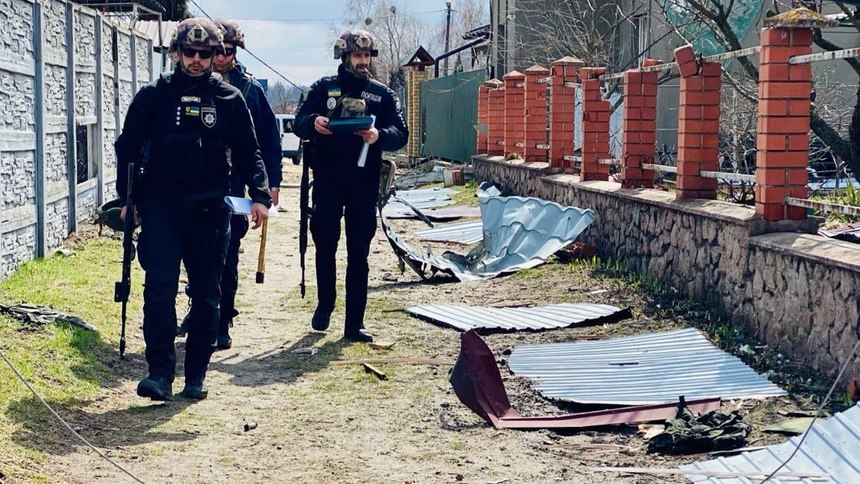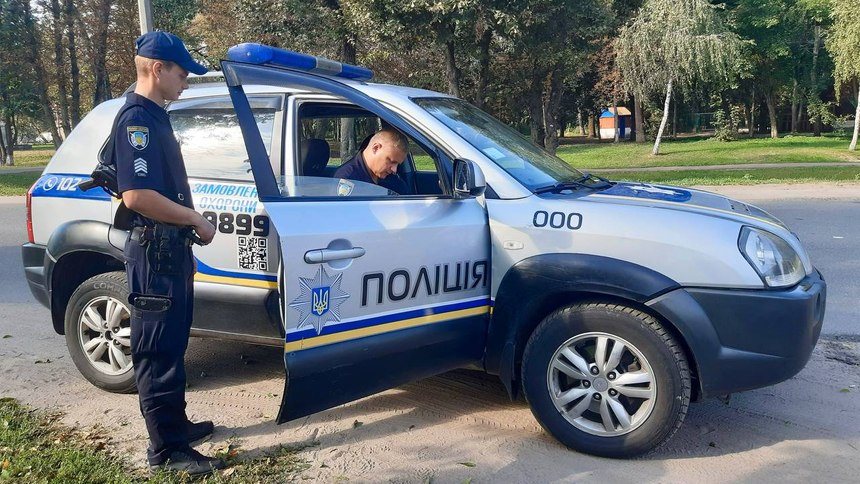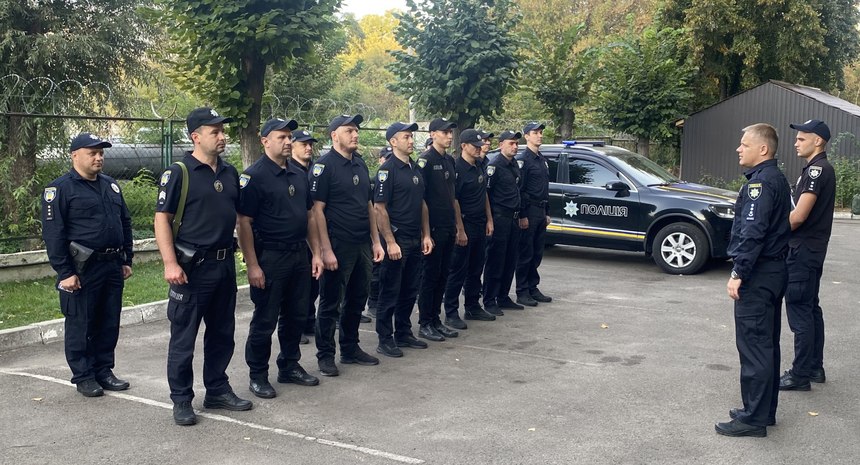
Welcome to Behind the Global Shield, a new column from Police1 that will put you in the boots of patrol officers and the wingtips of police executives in locations from Kyiv to Kinshasa, Brussels to Brisbane, and Dubai to Durban. You will get a glimpse of both unique challenges and familiar issues faced by your colleagues around the world − an opportunity to gain insights, ideas, practices, policies and contacts for your own forces.
By Michael Gips and Paul Goldenberg
Ukrainian police approach a man in his mid-thirties. He’s unshaven and dressed like a laborer, but suspiciously looking at a rail line that runs through the capital, Kyiv.
“Palyanitsya,” an officer shouts out. That’s odd. Palyanitsya is a type of local hearth-baked bread.
Before Russia’s invasion of Ukraine on February 24, 2022, the police might have been asking about stolen bread or drugs hidden in the dough. Now, with the country at war and many cops juggling civilian and military duties, “palyanitsya” has a much more existential purpose for Ukrainian police. Russians have difficulty pronouncing the word correctly, which betrays their nationality and likely sympathies and intent.
The man could be a Russian saboteur or provocateur.
February 24, 2022: Russia invades
Before the siege, Ukrainian officers had the same duties as most officers around the globe: intervene in domestic disputes, respond to robberies and muggings, arrest shoplifters and document traffic accidents. While those roles have not vanished, they have been greatly displaced by much graver responsibilities: capturing enemy infiltrators and spies, responding to rocket attacks, evacuating villages, getting heavy weapons off the streets, securing infrastructure, documenting war crimes and trying to identify the lifeless scattered along the streets.
“The 24th of February changed exactly everything,” said Viktor Veklych, colonel of the Security Police Department for the Kyiv region, who specializes in critical infrastructure protection. “All of our personnel were called in for combat awareness, and we all came back to our barracks.”
In an instant, the officers were operating under the nation’s military administration.

In the early days of the war, the police pivoted to sifting through the rubble of demolished buildings or villages, evacuating residents, providing medical assistance and temporary shelter, and distributing food, water, medicine and other necessities.
“I recall the day well. It seemed to last forever,” said Ivan Vyhivskyi, a General of the Third Rank of the National Police of Ukraine. “Enemy forces coming from the territory of the Republic of Belarus tried to take the capital, and, as a result, all of our police officers soon became united, and without warning we found ourselves a leading actor of the resistance.” That marked the beginning of a dramatic shift in responsibility for Ukrainian police, with units taking on EMT roles or military duties in tandem with the Ukrainian Army and National Guard. For example, Vyhivskyi says police were part of the military units that held out during the Siege of Mariupol until Ukrainian forces were ousted on May 16, 2022.
In the early days of the war, the police pivoted to sifting through the rubble of demolished buildings or villages, evacuating residents, providing medical assistance and temporary shelter, and distributing food, water, medicine and other necessities. In fact, police have become so commonly associated with emergency services that some units have been nicknamed “white angels” by the citizenry because they travel in white vans, says Vyhivskyi.
Regional and municipal police tailored their services to the exigencies of their regions. Kyiv police created a directory of bomb shelters overlaid on the map of the city that officers downloaded onto their tablets. Officers anywhere in Kyiv could instantly tell citizens where the closest bomb shelter was. Teaming with the army and national guard, police also staffed thousands of checkpoints across the region to keep people out of dangerous areas and to enforce curfews.
For Maria (an alias), who has been an officer since 2019, the invasion was personal. “My life changed completely,” she said, describing the loss of her house. “I live day to day and don’t plan for the future.” Her desperation and defiance are emblematic of many of the police officers who have transitioned to war duty.
Ukraine holds, police adapt
Russia expected a quick and decisive victory in Ukraine. Vladimir Putin purportedly believed Kyiv would fall in just a few days, with the rest of the country crumbling thereafter. As of the time of this writing, the war had stretched across 21 months.
While Russian attacks remain fearsome, they are less frequent and less sustained, allowing police to resume former duties and transition to similar responsibilities. Many of the activities immediately after the invasion have already been scaled back. Thousands of checkpoints have been reduced to 322 in Kyiv Oblast. Curfews have shrunk. Evacuations and aid missions have dwindled as attacks become less frequent. “As we liberate territories, we are recovering traditional functions,” Vyhivskyi said.
Currently, police have been working with armed forces to free occupied areas, including the recently recovered city of Verbove. “Nowadays, our officers are liberating the motherland,” Vyhivskyi said. That entails such new responsibilities as detection and seizure of explosives, de-mining and capturing gun runners, he says.

Much of the current police work involves identifying infiltrators, saboteurs and provocateurs working for the Russian cause.
At the same time, he adds, they have taken on the grim work of “investigating war crimes committed by the enemy,” whether it be a drone strike on civilian homes or a rocket attack on a maternity hospital. “As you can imagine, they find mass graves, evidence of torture chambers, and signs of inhuman conditions,” Vyhivskyi said. Their work includes having forensic investigators analyze DNA of sometimes minute body-part fragments to identify the dead to give families closure and enable proper burials. Vyhivskyi says his team is working with the National Police of Ukraine to investigate 92,000 separate war crimes. More than 1,000 Russian servicemen currently face charges for those crimes.
Much of the current police work involves identifying infiltrators, saboteurs and provocateurs working for the Russian cause. Stopping weapons smuggling has also come to the fore. “We are trying to prevent them from going across the border to Europe where they can be used for crime,” Vyhivskyi said.
But the proliferation of weapons means that the police are more heavily armed as well, Maria noted. Traditional pistols have given way to submachine guns. Officers have also gotten up to speed on the use of high-tech weapons and equipment such as drones and night-vision goggles.
One of law enforcement’s toughest ongoing tasks involves protecting Ukraine’s vast infrastructure of nuclear plants, electric stations, ports, railways, harbors, factories, bridges and other vital services. Veklych noted that his force is responsible for more than 88,000 separate elements of infrastructure, both publicly and privately owned. Successful attacks, of course, impair Ukrainian’s ability to travel, ship and deliver goods, keep factories running, supply clean water and otherwise keep the country functioning. Last November, Russia bombarded thermal, hydroelectric and other power plants to deprive much of the country of heating, electricity, water and other basics as winter set in. The cities of Odesa, Chernihiv and Lviv fell off the grid completely.

Officers pictured during roll call.
Crime shifts
Civilian crime has dropped since February 2022. Whole villages or city sections have disappeared, abandoned to rubble. With a dramatic drop in population, crime has dropped accordingly.
Overall, crime has dropped 10%, and property crime is down 40%, according to Ukrainian police records. Because authorities impose a curfew between midnight and 5 a.m., late-night crime has fallen precipitously.
However, there’s one major exception to the drop in crime: illegal weapons proliferate. “Normal people now use illegal weapons such as R15s and shotguns for protection,” Maria said. When police get an emergency call, they must prepare military-grade weaponry.
Public support surges
As a young democracy, Ukraine has struggled to create trust among its people and law enforcement. The Russian invasion has helped that relationship dramatically. Surveys showed that only 38% of the Ukrainian public trusted law enforcement before the war. Six months into the invasion, that number had almost doubled, jumping to 70%, though it had dropped to about 60% as of the time of publication.
Previously, law enforcement was considered a potential antagonist. Today they are protectors and brothers and sisters in arms who provide necessities such as food and medicine, Maria said.
“There’s much more respect on the street for them now because they put themselves in harm’s way,” said Andrii Lukashenko, a private security professional and former executive of the Organization for Security and Co-Operation in Europe, Special Monitoring Mission to Ukraine, who works closely with Ukrainian law enforcement. “Police have become part of the family. They are liberators. They protect us.”
In many cases, police stay to protect the remnants of decimated populations.
“Last week I paid a visit to a settlement in Zaporizhzia [in southeast Ukraine], 4 kilometers from the front lines,” Vyhivskyi said. “Despite having no mobile connection, despite the fact that only a few citizens are left and the fact that the city is almost entirely destroyed, there is still a police presence.” That kind of commitment engenders fierce loyalty and camaraderie. “Owing to his very story and similar stories taking place all over Ukraine, the level of public trust has risen,” Vyhivskyi said.
Minding mental health
Two of the world’s highest-risk occupations for posttraumatic stress disorder (PTSD) are military service and law enforcement. So, one might expect Ukraine’s combination soldier-police officers to especially suffer those effects.
But that hasn’t been so, say police officials. First, officers self-select for direct combat; they are not required to go to the front. Second, each unit has a staff psychologist on hand to help officers deal with their emotions. They closely observe the men and women of their unit to identify early signs of PTSD and take preventive measures. Clinicians live among the officers and speak to each of them at least weekly.
To relieve officers of constantly worrying about the safety of their families, police authorities offered to relocate families living in perilous areas to homes in safer locations. This has given the police comfort and reduced stress greatly, Maria said.
Support from abroad also buoys their mental state. Every officer and official interviewed for this article expressed gratitude to the United States, allied nations and their taxpayers for supporting the Ukrainian cause. It’s not just the vast material assistance with armaments, supplies and food. It’s steadfast encouragement and commitment.
“Verbal support is important to us,” Veklych said. “We feel it from around the world. And that gives us hope.”
Special thanks to Andrii Lukashenko, who arranged several of these interviews and translated between Ukrainian and English in real time.
This is the second in a continuing series on international policing. Last month, we covered Swedish police fighting transnational gangs.
About the authors
Paul Goldenberg spent nearly three decades in law enforcement; from walking a beat in the urban streets of Irvington, New Jersey to serving 10 years as a senior advisor to the Secretary of Homeland Security. For the past two decades, he has worked globally with police agencies across Europe, Scandinavia, the UK and in the Middle East in his capacity as Chief Advisor of Police and International Policing with the Rutgers University Miller Center on Policing and Community Resilience. Prior to that, he worked with the OSCE – the Organization for Security and Cooperation in Europe, the largest regional government security org in the world – to develop their first international police training program in domestic terrorism, hate crime and human rights. He is also a Distinguished Visiting Fellow for the University Ottawa PDI for Transnational Security, a senior officer with the Global Consortium of Law Enforcement Training Executives, CEO of Cardinal Point Strategies, and a former senior member of the NJ Attorney’s General Office.
Michael Gips, the former Chief Global Knowledge Officer and Chief Security Officer for ASIS International, is a renowned expert in global security. He has worked on the ground and presented in such locations as Madrid, Hong Kong, Sao Paulo, Kuala Lumpur, Sydney, London, Warsaw, Mexico City, Istanbul and Tel Aviv. He has won multiple awards for his security work and professional writings, and has published more than 1,000 articles. He is an officer of the Global Consortium of Law Enforcement Training Executives (GCLETE), an advisor at Cardinal Point Strategies, and a principal at Global Insights in Professional Security.


